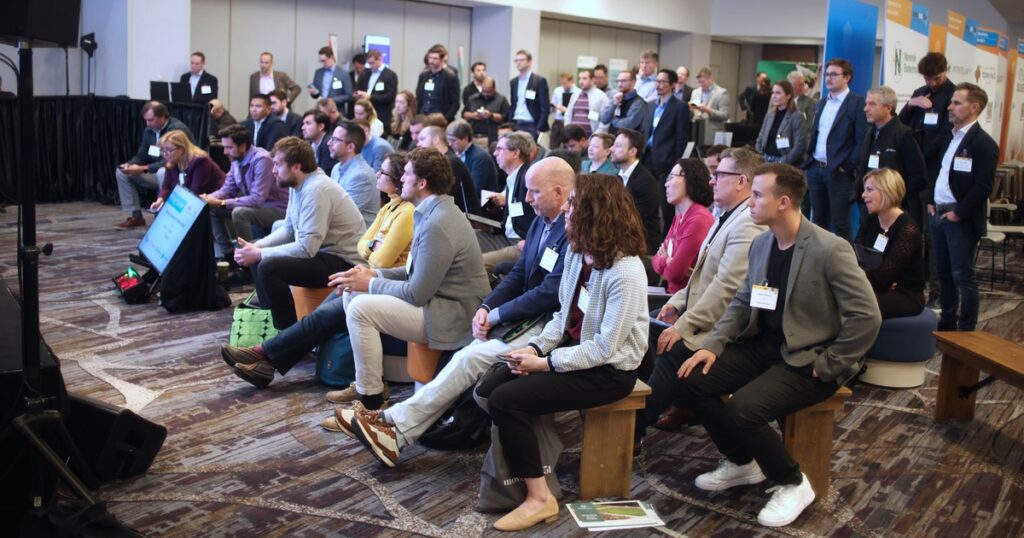From automated sprayers and drones to self-driving tractors and farm business software, technological advances are changing the way we farm. This slideshow provides a special look at the technologies that could be on your farm or office in five years.
Why is this important? Agricultural technology is a fast-growing industry, and the upward trend is expected to continue for the foreseeable future. According to AgFunder's Global, global investment has steadily increased over the past decade, from $1 billion in 2012 to more than $10 billion in 2022. Agri-Food Tech Investment Report 2023.
Few places in the United States see this investment more clearly than at the annual World AgriTech Innovation Summit in San Francisco.
“Agricultural technology is no longer about the farmer in the field with a pitchfork. The level of sophistication in this field is very high,” says Marcelo Pomerantz, an associate at Cooley, a global law firm focused on life sciences. he says. The firm assists small and medium-sized agricultural technology startups with litigation and patent protection.
Big tech brands like Google, Amazon, and Microsoft, which have traditionally had no footprint in agriculture, are also trying to ride the wave. As a result, farming is full of new tools, some of which may not be collected at the farm gate.
“I think farmers are understandably skeptical,” Pomerantz said. “They have a lot of people knocking on the door. But at the end of the day, results are results.”
Foreign companies are similarly vying for a slice of the North American market. For example, among the companies participating in the California Summit was Towing, a Japanese technology company that makes products for biochar pretreatment and microbial cultivation. The company's goal is to regenerate degraded soil.
“It makes the soil ready to supply nutrients. We're bringing this to the United States,” says Towing representative Takuto Nagata. The brand has already established a foothold in Japan, with 200 farmers using its products.
partner up
In a sense, the summit is a meeting place where innovation seeks to partner with venture capital. This included a start-up phase to formalize the process by allowing small businesses to pitch their ideas to larger companies.
In one session, Christophe Brod, CEO of BeeFutures in Oslo, Norway, talked about his company's technology, hive phototherapy, and said, “We're bringing technology to bees.” “If we want to increase pollination, we need to learn a lot from bees.”
Many others gathered at the booth seeking funding and partners to expand their business.
“We were able to chat with potential partners. We have the capacity and are ready to expand,” he said of the insect trap, which uses artificial intelligence to monitor egg hatching. says Terry Arden, CEO of CropVue Technologies, a Canadian company that installs solar cameras. “We are here to scale. We are looking for partners.”
CropVue Technologies is five years old and operates 6,000 units in 20 countries. We are affiliated with FMC. So far, Arden's cameras have been well received on farms.
“This is for the codling moth in the apple orchard,” Arden said as he displayed an image of the inside of the trap on his smartphone. The AI algorithm marks a circle around the insect, making it clearly visible. He brought up a graph of historical data and said, “If you look at all the numbers from last year, you'll see that pests invaded his May.''
When pesticides were used, numbers spiked, but then declined.
Guardian Agricultural representatives were also seeking investment to expand its agricultural electric vertical takeoff and landing (eVTOL) sprayer drones.
“This is one of the best events to meet people with a lot of money,” says Forrest Father, head of the startup's California location. Mr. Father, who comes from his sixth generation of California farmers, was displaying his new 20-gallon payload drone. He says it's larger and more robust compared to other products on the market.
Last year, Guardian received permission from the Federal Aviation Administration to operate its aircraft across the United States and secured at least $20 million in funding. According to the Guardian, the company's eVTOL is the first commercial-scale drone to begin operating in the United States. At least four machines are spraying crops in California's Salinas Valley.
“This is our first public appearance,” he says. “I think we’re in the right place in the right market at the right time.”

